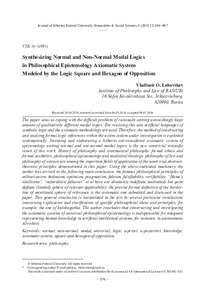Synthesizing Normal and Non-Normal Modal Logics in Philosophical Epistemology Axiomatic System Modeled by the Logic Square and Hexagon of Opposition
Скачать файл:
URI (для ссылок/цитирований):
https://elib.sfu-kras.ru/handle/2311/110306Автор:
Lobovikov, Vladimir O.
Лобовиков, В. О.
Дата:
2019-05Журнал:
Журнал Сибирского федерального университета. Гуманитарные науки. Journal of Siberian Federal University. Humanities & Social Sciences;2019 12 (5)Аннотация:
The paper aims at coping with the difficult problem of rationally uniting astonishingly huge amount of qualitatively different modal logics. For realizing this aim artificial languages of symbolic logic and the axiomatic methodology are used. Therefore, the method of constructing and studying formal logic inferences within the axiom system under investigation is exploited systematically. Inventing and elaborating a hitherto not-considered axiomatic system of epistemology uniting normal and not-normal modal logics is the new nontrivial scientific result of this work. History of philosophy and systematical philosophy, formal ethics and formal aesthetics, philosophical epistemology and analytical theology, philosophy of law and philosophy of science are among the important fields of application of the nontrivial abstract-theoretic principles demonstrated in this paper. Using the above-indicated machinery the author has arrived to the following main conclusion: the famous philosophical principles of utilitarianism, hedonism, optimism, pragmatism, fideism, falsifiability, verifiability, “Hume’s Guillotine”, “naturalistic fallacies” et al have not absolutely indefinite (unlimited) but quite definite (limited) sphere of relevant applicability; the precise formal definition of the border-line of mentioned sphere of relevance is the axiomatic one submitted and discussed in the paper. This general conclusion is instantiated in the text by several particular conclusions concerning explication and clarification of specific philosophical ideas and principles, for example, the one of kalokagathia. The author concludes that constructing and investigating the axiomatic systems of universal philosophical epistemology is indispensable for adequate representing human knowledge in artificial intellectual systems, for instance, in autonomous AI‑robots Цель статьи — решение трудной проблемы рационального объединения ошеломляюще огромного количества качественно различных модальных логик. Для достижения
этой цели используются искусственные языки символической логики и методология
аксиоматики. Поэтому систематически используется метод конструирования и изучения формальных логических выводов в исследуемой аксиоматической системе.
Новым нетривиальным научным результатом этой работы является изобретение
и детальная разработка до сих пор не исследованной аксиоматической системы эпистемологии, объединяющей нормальные и ненормальные логики. Важными областями
приложения нетривиальных абстрактно-теоретических
принципов, обоснованных
в этой статье являются история философии и систематическая философия, формальная этика и формальная эстетика, философская эпистемология и аналитическая
теология, философия права и философия науки. Используя вышеуказанные средства,
автор пришел к следующему основному выводу. Знаменитые философские принципы
утилитаризма, гедонизма, оптимизма, прагматизма, фидеизма, фальсифицируемости, верифицируемости, «Гильотина Юма», «анти-натурализм» … имеют не абсолютно неопределенную (неограниченную), а вполне определенную (ограниченную) сферу уместной применимости; точное формальное определение границы упомянутой
сферы релевантности является аксиоматическим; оно представлено и обсуждается в данной статье. Этот общий вывод экземплифицируется в тексте серией частных выводов, касающихся уточнения и прояснения специфических философских идей
и принципов, например, принципа калокагатии. В заключении автор делает вывод что,
конструирование и исследование аксиоматических систем универсальной философской эпистемологии необходимо для адекватного представления человеческого знания в искусственных интеллектуальных системах, например, в автономных роботах
с элементами искусственно интеллекта
Коллекции:
Метаданные:
Показать полную информациюСвязанные материалы
Показаны похожие ресурсы по названию, автору или тематике.
-
Satisfiability in a Temporal Multi-valueted Logic Based on Z
Kiyatkin, Vladimir R.; Kosheleva, Anna V.; Кияткин, Владимир Р.; Кошелева, Анна В. (Сибирский федеральный университет. Siberian Federal University, 2022-02)In this paper we continue the series of papers by V. V. Rybakov devoted to properties of multi-valueted logics and where he propose a new approach for modelling knowledge and reasoning of agents in a multi-agent system. ... -
Legal Qualification as a Logical Method of Cognition
Vlasenko, Valerii N.; Власенко, В.Н. (Сибирский федеральный университет. Siberian Federal University., 2016-01)The article examines in detail the logic basis of legal qualification, the major stage of application of the law, the means of specification of the provisions of the rule of law. Two blocks of logic rules to be observed ... -
Разрешимость многомодальной линейной логики знания и времени LTK
Lukyanchuk, Alexandra N.; Лукьянчук, Александра Н. (Сибирский федеральный университет. Siberian Federal University., 2013-04)Thepaperinvestigates modal(temporal-model) logicsbased at a semantic approach with models combining knowledge and time. We introduce multi-modal logics LT Kr and LT Kir containing modalities for knowledge and time as the ... -
Temporal multi-valued logic with lost worlds in the past
Рыбаков, Владимир Владимирович (2018-04)We study many–valued temporal multi–agent logics based on non-transitive models. The semantical basis, i. e., relational models, are used for modelling of computational processes and analysis of databases with incomplete ... -
MANY–VALUED MULTI–MODAL LOGICS, SATISFIABILITY PROBLEM
Моор, Михаил Александрович; Рыбаков, Владимир Владимирович (2018-08)This paper investigates many–valuated multi–modal logics. The suggested semantics consists of relational Kripke–Hintikka models which have various accessibility relations and distinct valuations for propositional statements ...

